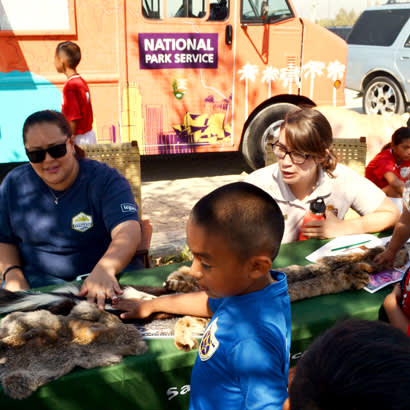
Dreamers from Anahuak Youth Sports Association and The City Project have been coming together to use soccer as an organizing tool for healthy active living along the L.A. River and beyond since 2000. They’ve helped lead community agitation for Río de Los Angeles State Park, L.A. State Historic Park, Sonia Sotomayor Learning Academies and River revitalization. They continue the fight against green displacement.
Not Just a Game
Raul Macías, a successful businessman and owner of a textile factory, knew neighborhood children had no place to play. He got a few of them together, paid for their uniforms, shoes, balls, coaches and fields, and formed a soccer team. The team soon grew from 20 players to thousands of students and their families and friends, who now make up the Anahuak league. The league is named in honor of an Aztec place of land and water.
Working with civil rights lawyers and organizers from The City Project, Anahuak began holding leadership training workshops at coaches’ meetings. Players, coaches, families and friends began speaking out, in English and Spanish, at public hearings and submitting written comments about various issues to government agencies. “Anahuak,” Macías says, “is not about creating good soccer players. Anahuak is about creating good citizens.” Today, when elected officials want to meet with their constituents, they attend Anahuak tournaments and coaches’ meetings. “People think I just snap my fingers and hundreds of people come out,” Macías points out. “No. This is our work: We do organizing to unite people.”
Our Stories
Paco Serrano has been assistant director of Anahuak for years. He received his first driver’s license in 2015 under a new state law providing licenses for undocumented residents. Gil Cedillo, who wrote the law when he served in the state assembly, now serves on the city council. Anahuak and their home park are in his community.
The license freed Paco to drive without fear of being arrested for driving without a license, to buy his own car and to get insurance. Paco drives players whose families don’t have cars of their own to Anahuak tournaments.
Dayana Molina is a Dreamer. She was the first girl to join the Anahuak league when she turned 13, and played until graduating high school. She still volunteers her time 17 years later and worked as an organizer at The City Project when she became a Dreamer. Molina plans to finish college. “Dreamer status has given me hope,” she shares. “It makes me think perhaps this country is finally taking steps forward toward comprehensive immigration reform. I would like a path to citizenship, and I would like the right to vote. I am hopeful my efforts to gain my degree will not be in vain. I hope the laws will change to make it possible for hard working immigrants to count and live the life we deserve.”
I am an immigrant. My father was deported twice. My mother’s brother came to the United States at 17 to join the Air Force. He became a citizen with his commanding officer’s support. He helped our family get here with green cards and served in the military for decades until retiring.
I arrived when I was four, graduated from Stanford University and Stanford Law School, became a civil rights attorney and served as an Assistant U.S. Attorney in Manhattan. Today, my family includes graduates from and students at Boston College, Boston University, Colgate, Columbia, Cornell, Harvard, Northeastern, NYU, Princeton, Stanford (two generations), SUNY, and UC, with more on the way. My family includes a pediatrician, professionals, entrepreneurs, investors, small business owners, workers and just plain good people in communities across the nation. We don’t fill only jobs no one else wants. We hold and create coveted positions. We pay taxes. We vote.
The Struggle Continues
Anahuak and The City Project organize “Day in the Park” events to help get people active through our new initiative called Healthy Living in the Parklands. We organized the first-ever bilingual, multicultural, international “National Public Lands Day” with the National Environmental Education Foundation (NEEF) at Río de Los Angeles State Park in 2017.
Congressman Jimmy Gomez lives nearby and came to talk about college, jobs and park-poor, income-poor communities. State Park Ranger Luis Rincón recounted the community struggle to create the Park, and the Sonia Sotomayor school next door. National Park Service rangers in uniform brought “LA Ranger Troca,” the Santa Monica Mountains National Recreation Area’s community engagement vehicle that brings parks to the people. A uniformed LAPD Officer presented awards to Anahuak players to show police are there to protect and to serve, not to deport them. OneJustice, a legal aid organization, helped Dreamers and immigrants understand their rights. The county health department provided materials on health, parks and schools. Take Action Comics, GreenLatinos, League of United Latin American Citizens, National Parks Conservation Association and Nature for All pitched in, too.
But, Los Angeles is erasing the history of our community struggle by creating great urban parks. The city’s online “history” erases the community agitation and environmental justice litigation that resulted in river revitalization, Rio de Los Angeles State Park, where Anahuak plays, and L.A. State Historic Park. The nonprofit the city set up to raise money does not comply with the same civil rights and environmental justice laws that resulted in its creation and river revitalization.
The people of Anahuak fight epic battles to improve their lives and face the risk they will no longer be able to afford to live or even work near these parks and schools. Raul Macías, Paco Serrano and I keep fighting, but it’s not up to us. Younger generations, including immigrant children, like those growing up in Anahuak, will carry on the struggle for social equity, health and conservation. Parks and recreation provides a space for immigrants to come together and build community, forming the tapestry that is the United States.
Robert García is the Founding Director of and Counsel for The City Project.

